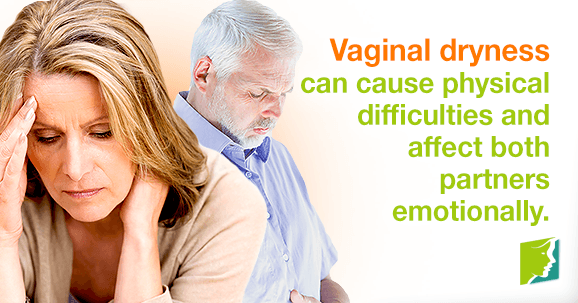Vaginal dryness is a menopause symptom that plagues many women in their forties and fifties. Characterized by pain and itchiness, dryness comes about primarily because of hormonal changes in the perimenopausal years that cause the vaginal tissues to become thin, lose elasticity, and produce less moisture. The physical and emotional effects of dryness have the potential to cause relationship issues: the discomfort that vaginal dryness can bring to the bedroom can be obstructive to sex life and cause self-esteem issues for both partners if it's not dealt with practically, honestly, and openly.
Sexual Effects
In terms of sexual intercourse, vaginal dryness can cause physical difficulties and discomfort. The vaginal tissues are usually self-lubricating, which enables comfortable penetration, but dryness can make this process difficult and even painful. This may impact both partners' enjoyment of sex or make the idea of intercourse seem completely unappealing, resulting ultimately in a loss of libido. Read questions and answers about vaginal dryness and sex.
Emotional Effects
Uncomfortable sex and loss of libido can have a number of emotional effects; after all, sex isn't just about lust and physical pleasure, but it's also an expression of intimacy, care, and love. A decline in regular and satisfying sex is likely to invoke feelings of emotional distance, not to mention hostilities and frustration.
Vaginal dryness can affect both partners emotionally in terms of self-esteem. For the woman suffering with the symptom, feeling less feminine, self-conscious, or embarrassed about dryness is common. For the partner, lack of awareness about the biological reason for dryness may make them assume the symptom itself or the change in the woman's behavior is reflective of a change in feelings towards them or their sexual performance.
Limiting the Impact of Vaginal Dryness
The most important way to limit the effects of vaginal dryness on your relationship is to be open and communicative with your partner. Choose a neutral moment outside of intercourse where you both have plenty of time to talk to ensure an unbiased, mutually supportive conversation. Explain the hormonal reasons behind vaginal dryness and make your inclusion of your partner clear with sentence-starters like “You've probably noticed...”
Reassure your partner that you love them and the symptom is not reflective of their skills as a lover. Suggest practical solutions to dryness in considerate ways; for example, sustained arousal increases blood circulation to the vaginal tissues and stimulates the secretion of moisture, so you could say, “I love it when we spend time exploring each other's' bodies during sex - perhaps we could spend longer on foreplay?” Suggesting fun ways to introduce a water-based lubricant into your sex life could also make sex more physically comfortable.
Keep Cuddling
If you're suffering with loss of libido, remain affectionate to maintain a sense of closeness outside of intercourse. Kissing and hugging will reiterate the bond you share emotionally and physically, and may ultimately reignite your libido.
Remember, though vaginal dryness is a symptom that affects you first and foremost, it will also have an effect on your partner, too, so include them by being open about it. It's likely your partner has noticed something's amiss, particularly if your sex life has become less regular or you are obviously feeling self-conscious or uncomfortable. Chances are, they'll be relieved to be told that the dryness is not their fault, and even more relieved to discover that it is easily treated with lifestyle adjustments and a change of habits. Read about dealing with vaginal dryness and painful intercourse.
Sources
- National Health Service Direct. (2010). Vaginal Dryness. Retrieved June 17, 2014, from http://www.nhsdirect.nhs.uk/~/media/Selfcare/FemaleSexualHealth/VaginalDryness.ashx
- National Health Service UK. (2012). Sex after the menopause. Retrieved 17, June 2014, from http://www.nhs.uk/Livewell/women4060/Pages/sex-after-the-menopause.aspx
- National Institutes of Health. (2011). Vaginal dryness. Retrieved June 17, 2014, from http://www.nlm.nih.gov/medlineplus/ency/article/000892.htm
- Office on Woman's Health. (2013). Relationships and Communication. Retrieved June 17, 2014, from http://www.betterhealth.vic.gov.au/bhcv2/bhcarticles.nsf/pages/Relationships_and_communication
- Office on Woman's Health. (2012). Menopause and Sexuality. Retrieved June 17, 2014, from http://womenshealth.gov/menopause/menopause-sexuality/




